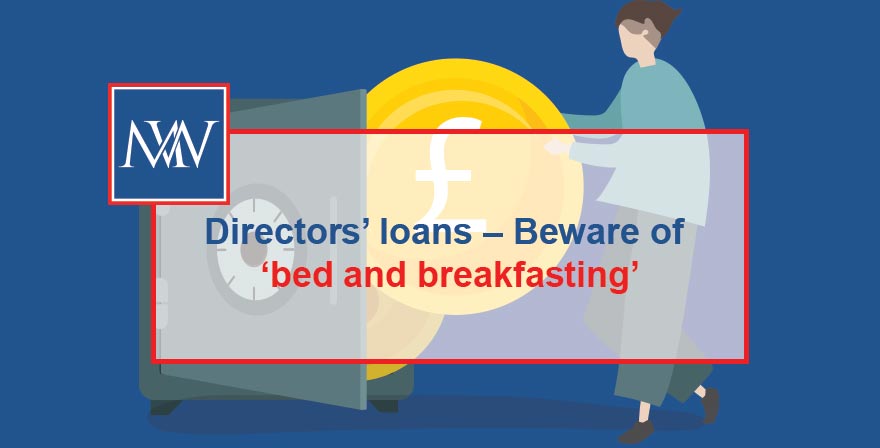
Directors’ loans – Beware of ‘bed and breakfasting’
It can make sense financially for directors of personal and family companies to borrow money from the company rather than from a commercial lender. Depending on when in the financial year the loan is taken out, it is possible to borrow up to £10,000 for up to 21 months without any tax consequences. However, if the loan remains outstanding beyond a certain point, tax charges will apply.
Company tax charge
In the event that a loan made to a director of a close company in an accounting period remains outstanding on the date when the corporation tax for that period is due, the company must pay a tax charge (‘section 455 tax’) on the outstanding value of the loan. The trigger date for the charge is the corporation tax due date of nine months and one day after the end of the accounting period. The amount of section 455 tax is 32.5% of loan remaining outstanding on the trigger date.
Traps to avoid
In days of old, it was relatively simple to prevent a section 455 charge from applying by clearing the loan balance just before the trigger date and, if the director still needed the loan, re-borrowing the funds shortly after the trigger date (bed and breakfasting). However, anti-avoidance provisions mean that as a strategy this is no longer effective.
Trap 1 – The 30-day rule
The 30-day rule comes into play where, within a period of 30 days of making a repayment of £5,000 or more, the director re-borrows money from the company. The rule effectively renders the repayment in-effective up to the level of the funds that are re-borrowed. Section 455 tax is charged on the lower of the amount repaid and the funds borrowed within a 30-day window.
Example
John is a director of his personal company J Ltd. The company prepares accounts to 31 January each year. In May 2018, John borrowed £8,000 from the company. On 28 October 2019, he repays the loan with money lent to him by his wife. On 7 November 2019, he re-borrows £7,000 from the company to enable him to pay his wife back. He does not make any further borrowings in November 2019.
Corporation tax for the year to 31 January 2019 is due on 1 November 2019. Although the director’s loan is not outstanding on that date, the 30-day rule bites and only £1,000 of the repayment made on 28 October 2019 is effective — £7,000 of the £8,000 paid back is re-borrowed within 30 days. Consequently, the section 455 charge applies to £7,000 – the lower of the repayment and the funds borrowed within 30-days of the repayment – and the company must pay section 455 tax of £2,275 (32.5% of £7,000).
Avoiding the trap
The 30-day rule can be avoided if the company pays the director a dividend, bonus or any other payment that’s taxable and this is used to repay part or all of a loan. In this situation, it’s OK to take another loan from the company within 30 days without the anti-avoidance rule being triggered. Keeping repayments and re-borrowings below £5,000 will also prevent the 30-day rule from biting.
Trap 2 – Intentions and arrangements rule
The ‘intention and arrangements’ rule applies where the balance of the loan outstanding immediately before the repayment is at least £15,000, and at the time a loan repayment is made there are arrangements, or an intention, to subsequently borrow £5,000.
This rule applies even where the new borrowing is outside 30 days. The rule bites if the repayment is made with the intention of redrawing at least £5,000 of the payment, irrespective of when this is done. Again, the rule does not apply to funds extracted by way of a dividend or bonus as these are within the charge to income tax.
Plan repayments carefully
Where looking to repay loans to prevent a section 455 charge from arising, these should be planned carefully to avoid falling foul of the traps.
Need Accountancy Support?
For information on bespoke training, or if you have any other questions for Makesworth Accountant, please fill in your details below
















 151
151